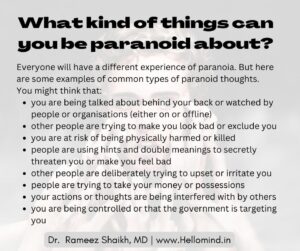Know someone who has a paranoid worldview and is intensely suspicious and untrusting of others? Here’s how to identify PPD and assist your loved one in receiving care.
What is paranoid personality disorder (PPD)?
A long-term habit of mistrust and suspicion of people without good cause is a sign of paranoid personality disorder (PPD), a mental health disease (paranoia). People with PPD frequently think that others are threatening, demeaning, or harming them.
Many times, those who suffer from paranoid personality disorder do not believe that their actions or way of thinking are harmful.
What are symptoms of paranoid personality ?

- Doubt the sincerity, fidelity, or reliability of people, thinking that they are taking advantage of or fooling them.
- Because they are concerned that the knowledge will be used against them, they are reluctant to confide in people or provide personal information.
- Be resentful and unforgiving.
- Be overly sensitive and have a terrible sense of humour.
- Interpret hidden messages in others’ casual glances or harmless statements.
- Persistently suspect their spouses or love partners are being unfaithful but without cause.
- be cold and aloof in their interactions with others and may develop jealousy and control in an effort to prevent betrayal.
- not recognise their part in issues or disputes and think they are always correct.
- have trouble unwinding.
- Be antagonistic, intransigent, and combative.
What are treatment option for paranoid personality ?
Dr. Rameez Shaikh, MD Consultant Psychiatrist & Psychotherapist at Mind & Mood Clinic, says that ” The mainstay of therapy for paranoid personality disorder is psychotherapy. A therapist can assist your loved one in acquiring abilities for increasing empathy and trust, enhancing relationships and communication, and better managing with PPD symptoms. Your loved one is more likely to benefit from individual counselling than group therapy because the company of others may exacerbate paranoid thoughts and nervous behaviour.”
- Someone with paranoid personality disorder can learn to identify their harmful ideas and thought patterns with the aid of cognitive-behavioral treatment (CBT).
- CBT can assist your loved one’s interactivity with others and lessen paranoia by altering how these ideas affect their conduct.
- Additionally, CBT can teach people other effective coping mechanisms for their emotions other than verbally abusing others.

Dr. Rameez Shaikh (MBBS, MD, MIPS) is a consultant Psychiatrist, Sexologist & Psychotherapist in Nagpur and works at Mind & Mood Clinic. He believes that science-based treatment, encompassing spiritual, physical, and mental health, will provide you with the long-lasting knowledge and tool to find happiness and wholeness again.
Dr. Rameez Shaikh, a dedicated psychiatrist , is a beacon of compassion and understanding in the realm of mental health. With a genuine passion for helping others, he combines his extensive knowledge and empathetic approach to create a supportive space for his patients.

